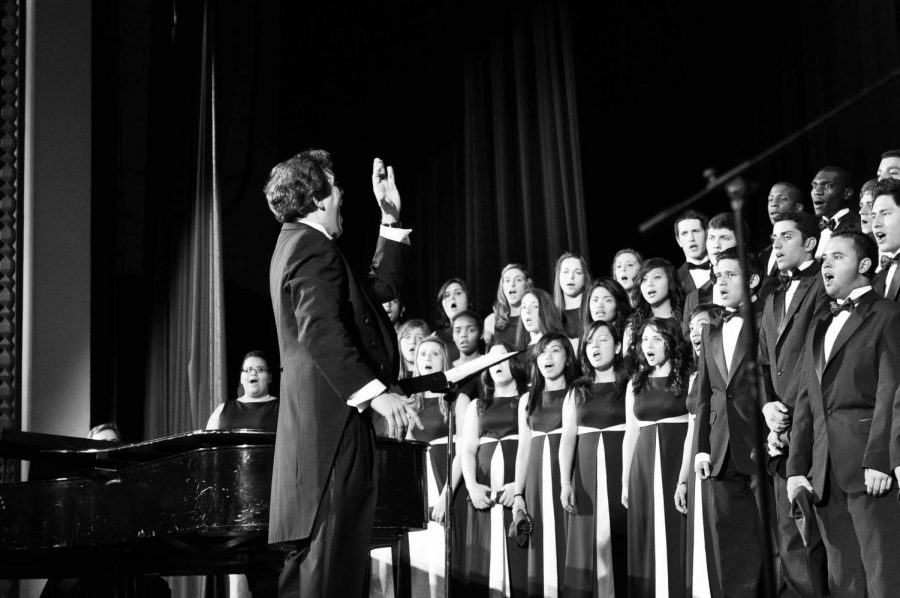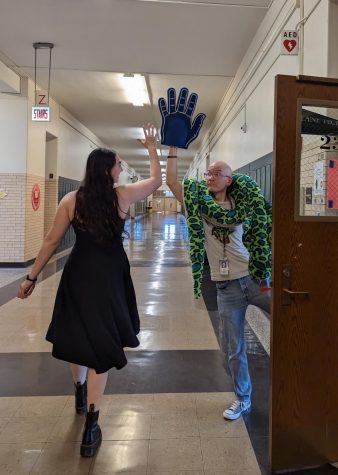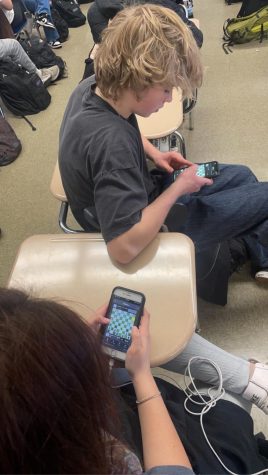The musical masterminds behind a winter concert
Mark Carrera, one of Lane’s two choir conductors, leads concert choir in a past winter concert. (Photo courtesy of Lane Tech Choir Department)
January 22, 2018
Giving the cue for the piano to begin, Mr. Mark Carrera, one of the two choir teachers at Lane, begins conducting the third song of the Dec. 13 winter choir concert: “Breath of Heaven.”
Having his back towards the audience, he can’t see their reactions until after the piece was performed.
He begins with a swaying motion of his arm, signalling the accompanist to start. After waiting for the beats to play out, he begins giving cues for his singers to start.
The choir’s focus remains solely on him as they anticipate his hand movements and signals to guide them throughout later parts of the song.
As a conductor, he is in charge of choosing the music pieces that make it in the choir concerts, how they want the song to be and who sings it.
A conductor authorizes their commands through physical motions and verbal instructions and through their ‘musical visions’ for the concerts, according to the League of American Orchestras.
At Lane, the choir, band and orchestra teachers all act as conductors for their concerts. This gives the students a familiar face to perform with, having learned their teacher’s style from months or years of practicing with them.
Despite knowing the music piece front and back, the choir or band still needs a conductor to properly guide them.
“It is impossible for them to cut off at the same time — for a large choir it is almost impossible,” Carrera said. “In a small ensemble, 10-15 kids, they can look at each other and know when to cut off, but for a big group of 70, they’re all looking forward, it’s impossible for them to know when to stop, and when to come in.”
Carrera has been coordinating concerts ever since he began working here 20 years ago. Having around 300 choir students in five choirs — with A Cappella as a new addition — in any given year, it takes months to prepare a winter concert.
Music pieces are chosen as early as the first week of school — or the summer for Marching band — and students learn 5-6 compositions before the December concerts.
Carrera said his goal for any concert is to be as accurate as possible, even with the continuous practice and improvements, he believes there has never been a piece that was 100 percent correct.
On top of simply getting all the notes right, an ensemble is in charge of producing a lively dynamic to keep the audience entertained. This cannot be done if an ensemble does not know where to step in and when to stop.
Dynamics means something different to instrumentalists than it does to vocalists. For orchestra and band, dynamics come from volume and intensity of the piece of music.
However, choir has words on top of that. Diction and emphasis on certain consonants and vowels also have to be taken into account, Carrera said.
“Orchestra you go and listen and you paint your own picture in your mind, but I think choir is a little more powerful because not only do we get all the music, you get all the parts,” Carrera said. “You get all the words and I think choir is a little more powerful in that area. We can speak words, we can speak languages.”
Just as musicians practice their pieces at home, conductors also practice to give the right cues and to be engaging to their students for the big day.
Practice is one thing Carrera feels is overlooked by his students. Often times his students underestimate the work he puts into his conducting techniques, believing they can easily do it.
With the school year dedicated to preparing for concerts and competitions, the performance is what Carrera finds to be the most enjoyable.
“I love it. When teenagers sing a song beautifully. That is what brings me the most joy, like ‘That Ever I Saw’ coming along nicely,” Mr. Carrera said. “And it’s fun to sing, when you know something that sounds so spectacular. That what I think I really like about conducting.”






